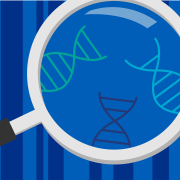Genomics in midwifery: A changing landscape
We explore genomics’ real-world application and potential in a conversation with national midwifery lead for NHSE/I, Donna Kirwan
This article is based on a conversation with Donna Kirwan that was recorded for the #GenomicsConversation 2021. The podcast is available to listen to here.
Through the #GenomicsConversation week, we want to continue to develop communication with midwives and help keep them informed about genomics. Here, we speak to NHS England and NHS Improvement Genomics Unit national midwifery lead Donna Kirwan about midwifery practice today and what midwives need to know about genomics in an evolving healthcare landscape.
Hi Donna. Many midwives don’t see the relevance of genomics to their role. Why do you think that is?
Often, I think midwives may feel that genomics is above and beyond their scope of practice – something that is only relevant to specialists, for example clinical geneticists or scientists, and this perception could still be a factor. The term itself is overwhelming, whereas the word ‘genetics’ resonates with most people – they ‘get’ it!
Although the science has been around a long time, overall, it’s still a new concept to nurses and to midwives. People tend to think that it’s just about ‘testing’ when in fact it’s much more than that. Genomics is a broad discipline including the context in which a particular test, result and diagnosis is undertaken. Given that genomics is within the foothills of the change in the delivery of medicine some lead midwives for education (LME), made a commitment to develop and align genomics within their pre-registration BSc midwifery programmes. Similarly, post-registration modules are available for qualified midwives to progress their learning.
How is genomics being used today in midwifery practice?
Although ‘genomics’ has yet to be fully embraced by midwives, they are in fact using it every day. For screening and fetal medicine midwives, genomics is far more well understood given it is an integral part of their practice. Non-invasive prenatal testing (NIPT), non-invasive prenatal diagnosis (NIPD), rapid prenatal whole exome sequencing (RP-WES), and rapid postnatal whole exome sequencing (RP-WES) in neonates are all genomics-based, have been nationally commissioned and form part of maternity care packages. The ‘game-changing’ Pharmacogenetics to Avoid Loss of Hearing (PALoH) study, where a genomic ‘point of care’ device to check newborn babies for genetic gentamycin susceptibility, is now being rolled out across three NHS hospitals by nurses and midwives.
As mentioned, genomics comes in many guises. For example, the ‘booking appointment’ which includes gathering a medical and family history can be considered genomic, as the midwife in discussion with the expectant mum is looking for genetic indicators (also known as red flags), which may potentially have a negative health impact on maternal and fetal wellbeing. The scope of enquiry relates to first-degree relatives. If questions or concerns are raised by the woman regarding relatives outside of this scope, however, the midwife must be confident in knowing what to do next. Perhaps there may have been young deaths, cancer, multiple cancers, or other conditions within a family, or a severe reaction to medication, diabetes, or epilepsy across more than one generation. Is the woman’s partner a close blood relative, has she suffered multiple miscarriages, or a pregnancy affected by multiple structural anomalies?
In recognising a pattern of ill health amongst family members, at a minimum, midwives should feel confident and competent to know how, where, and who to contact if in doubt. It is imperative that they seek and find a genetic counsellor or maternal/fetal medicine professional for their expert advice and guidance as the pregnant woman may require a genetic consultation including a risk assessment. This can inform about prevention and options for future generations as the implications for pregnancy and future pregnancies cannot be overstated. Furthermore, opportunities through research studies can help provide and develop future treatments.
You can read more about this in the Genomics Education Programme’s (GEP) midwifery resource.
Does this mean that all midwives now need to know about genomics?
Genomics is becoming more prevalent as advances in technology and understanding are creating new possibilities, so the answer is ‘yes’. The level of knowledge and understanding midwives need however, will depend on where they work and the role or area of practice they are involved with. Clearly, some midwives have diversified by enhancing their knowledge and skills for extended roles but where genomics is concerned, are not experts in this area. As such, closer collaborative working through a multidisciplinary team (MDT) meeting model is needed as there needs to be more than a superficial understanding about things.
Will the expansion of genomics into routine care bring new career opportunities for midwives?
There will be more opportunities for midwives to get involved in new research projects as well as education and training opportunities as genomics moves forward.
The seven Genomic Medicine Service Alliances (GMSAs) have been established to help embed genomics into routine care across England by bringing together vital multi-disciplinary clinical leadership and other operational functions to make this possible. Each NHS GMSA has a leadership team made up of a senior medical director, a chief nurse and several clinical leads, including a lead midwife, so midwives will be embedded into the fabric of the system across England.
Other opportunities will come in the form of the Genomics England Newborn Genomes Programme coming in 2023. The Genomics England-led pilot programme is working with the NHS to explore how whole genome sequencing could be used to screen newborn babies for rare genetic diseases, to identify children that could benefit from treatments and other interventions before they begin to show symptoms.
And lastly, what would be your top five pointers for midwives looking to learn more about genomics?
- First and foremost, we need to be lifelong learners! Once qualified, it’s not a done deal – the learning journey is just beginning. Nowadays, all nurses and midwives will need to have a basic understanding of genetics and where genomics is relevant to their role, which is why genomics is now included in the NMC standards of proficiency for registered nurses and midwives. So, I would encourage midwives to keep their eyes on the horizon and look out for genomic stories in the media and upskill via education and training programmes because it is paramount to being able to provide evidence based and effective care.
- When learning something new, I would recommend small, bitesize chunks of learning. It’s so easy to do and shouldn’t take much time. An academic qualification like a Master’s in Genomic Medicine is not required! It’s all about what suits you, what is relevant to your area of work.
- If you’re unsure of where to start, the easiest thing to do is to go directly to the GEP website. There’s plenty of information there – maybe start with a Genomics 101 course and see how you feel. There is a dedicated page on midwifery, too, as well as a genomics learning journey planner so you can gauge your level of understanding and go from there. When you do spend time learning, make sure that you plan in some time for reflection, and make sure to include this as part of your NMC revalidation.
- There is a lot of useful information on social media. I’ve learned a lot by looking on Twitter. If you know the accounts, hashtags and people to follow, you can gain a lot from that. I would encourage midwives to follow the official Twitter account of the NHS Genomic Medicine Service (@NHSgms) and the GEP (@genomicsedu).
- Finally, each NHS GMSA has a dedicated nurse and midwife that lead on genomic transformation programmes in your area. I recommend that you find out who they are and get to know them. Offer to get involved in the projects they are running and register with any local education and training events they are hosting. Midwives, as mentioned, are not trained counsellors or experts in genomics so getting to know and conversing with local genetic teams will be helpful. Be curious, get in touch and start a conversation!
–
Donna Kirwan is the national midwifery lead for genomics at NHS England and NHS Improvement’s Genomics Unit and has over 30 years’ nursing and midwifery experience. After qualifying as a nurse, she worked at the Royal Liverpool University Teaching Hospital. A couple of years later, she started her midwifery career at Oxford Street Maternity Hospital in Liverpool before moving onto a specialist midwife role where she helped to set up a tertiary fetal medicine service that covered the entire North West region.
Five years into her role as specialist midwife and coordinator, Donna qualified as a sonographer and became the first midwife-amniocentesis practitioner carrying out amniocentesis for women with higher-chance results from antenatal serum screening, with this taking place before the implementation of combined testing.
Roles as the regional antenatal and newborn screening coordinator for the North West of England and the NHS Fetal Anomaly Screening Programme as the national midwifery projects officer followed and whilst in post she completed a thesis for a Master of Philosophy which explored the experiences of pregnant women with red cell antibodies in pregnancy. During this time, there were many changes taking place in terms of new roles for midwives, new ways of learning and working, as well as the emergence of a robust, quality-assured screening framework for pregnant women and their babies.
After a period where she took on projects for the Department of Health and the Royal College of Obstetricians and Gynaecologists, Donna began working at the Clinical Genetics department at Liverpool Women’s Hospital as a recruitment practitioner for the 100,000 Genomes Project. During this time, she also completed a Master’s in Genomic Medicine
In 2020, she joined NHS England and NHS Improvement’s Genomics Unit in her current role as national lead midwife for genomics.
–










